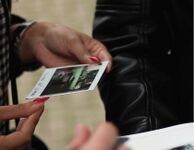Seminar Landscape Education for Democracy 2021
{{#evu:https://www.youtube.com/watch?v=U1FlOjd1bG8&feature=youtu.be |alignment=right |dimensions=500 |description= You want to learn more about the LED programme? Please have a look at the video documentation of our online seminar and intensive study programme 2016. }} Are you a planning or design student interested in learning how to create more inclusive, open and democratic landscapes?
- This page documents the LED Online Seminar conducted from April - July 2021
- For any further information please email us under info(at)led-project.org
- The 2021 LED2LEAP Course has partnered with the Learning Landscapes ERASMUS Group.
- Download the course outline as PDF
- For any further information please email us under info(at)led-project.org
Collaborating for Landscape Democracy
The landscape belongs to everyone. We should all have equal access to it and a voice in how it is used, valued and maintained. However, spatial planning education rarely includes considerations of democratic processes, participatory planning, community design and landscape stewardship. Furthermore, it does not fully prepare young practitioners to become leaders in promoting democratic landscape change and work effectively in partnership with communities.
The idea behind the LED (Landscape Education for Democracy) project, a partnership between 4 European landscape architecture faculties, two local NGOs and the LE:NOTRE Institute is to promote awareness and empower young design and planning professionals to become more active in shaping democratic change. Our goal is to fill a gap in design and planning education and give students the opportunity to confront themselves with pressing issues of landscape democracy, right to the landscape and participation.
The LED course 2021 includes 13 online course sessions available to students at any institution.
Our course will start again on March 31, 2021, at 17 pm CET.
What is this programme about and what is in it for you?
LED2LEAP stands for Landscape Education for Democracy: Towards Leadership, Empowerment, Agency and Partnership. Our programme is an endeavor to bring democratic principles into the range of disciplines that collaborate on landscape focused projects, providing the opportunity for this transformative approach to spread to all levels of society, resulting in more resilient, sustainable and democratic communities and landscapes.
Course Elements
LED2LEAP has three arms which reach out to engage communities involved in the project.
- Online Seminar: a semester-long international program for students and professionals that uses a digital platform to teach theories behind Landscape Democracy and hear from practitioners.
- Intensive Programme: A 10-day program where seminar participants travel to an international site to practice the values and apply the tools they’ve studied, by addressing a landscape democracy challenge.
- Living Labs An ongoing program that allows students to concurrently explore with the Participatory Action Research, Visioning and Co-Design approaches they’ve learned in the Online Seminar, and feedback their results.
Course schedule and content for 2021
Online seminar: March - July 2021
The online module consists of twelve 90-minute sessions of lectures, reading materials, collaborative group work, concept mapping, storyboarding and other diverse active and passive learning tools.
Themes covered in the course are:
- Democratic Landscape Transformation
- Democratic Landscape Analysis
- Collaborative Visioning and Goal Setting
- Collaborative Design
- Evaluation and Future Agenda Setting
- More details on the schedule will be published soon.
Conditions for participation and credits
Participation in the online seminar is free and open to students at any institution as well as the general public.
There are no registration fees. Participation is possible in two modes.
Full participation includes:
- regular attendance of the online class (or working with the seminar recordings in due time)
- completion of the seminar coursework and group assignments
- academic recognition of up to 5 ECTS
Following includes:
- visitation of online seminar sessions either in real time or through video recordings;
- possibility to do a final assessment
Further information
- please contact info(at)led-project.org
- Find us on Facebook
Project history
The Landscape Democracy teaching group exists since 2015. See below some impressions of our activites so far:
LED in action - some impressions from previous online seminars
Information material and LED resources
Our information materials for the upcoming 2021 course are currently being updated.
You can access LED lecture resources via this link:
- LED 2020 Materials and Recordings (open access)
- LED 2019 Materials and Recordings (open access)
- LED 2018 Materials and Recordings (open access)
- LED 2017 Materials and Recordings (open access)
- LED 2016 Materials and Recordings (open access)]
- LED reading list
Please visit the documentations of our previous online courses for further information:
For further information on the previous intensive study programmes please visit the following pages:
- LED Workshop Törökbálint,Hungary, 2018
- LED Workshop Kassel, Germany, 2017
- LED Workshop Zingonia, Italy, 2016
LED Publications 'Partnering for Landscape Democracy':
- LED Process Report: Landscape Education for Democracy Co-creating a socially-engaged landscape planning and design education for sustainable development, download LED Process Report: Landscape Education for Democracy
- Zingonia - Partnering for Landscape Democracy
- Kassel - Partnering for Landscape Democracy
- Törökbálint - Partnering for Landscape Democracy(all free download)
LED in action - some impressions from the Kassel workshop 2017
Our partnership
Seminar partners
- LE:NOTRE Institute (coordinator), an international foundation based in Wageningen, Netherlands.
- Nürtingen-Geislingen University, Nürtingen, Germany
- Hungarian University of Agriculture & Life Sciences, Faculty of Landscape Architecture, Budapest, Hungary
- KulturActiv, NGO, Budapest, Hungary
- University of Bologna, Department of Architecture, Italy
- ETABETA, NGO, Bologna, Italy
- SLU, Swedish University of Agricultural Sciences, Uppsala, Sweden
ERASMUS+ Strategic Partnership Programme










